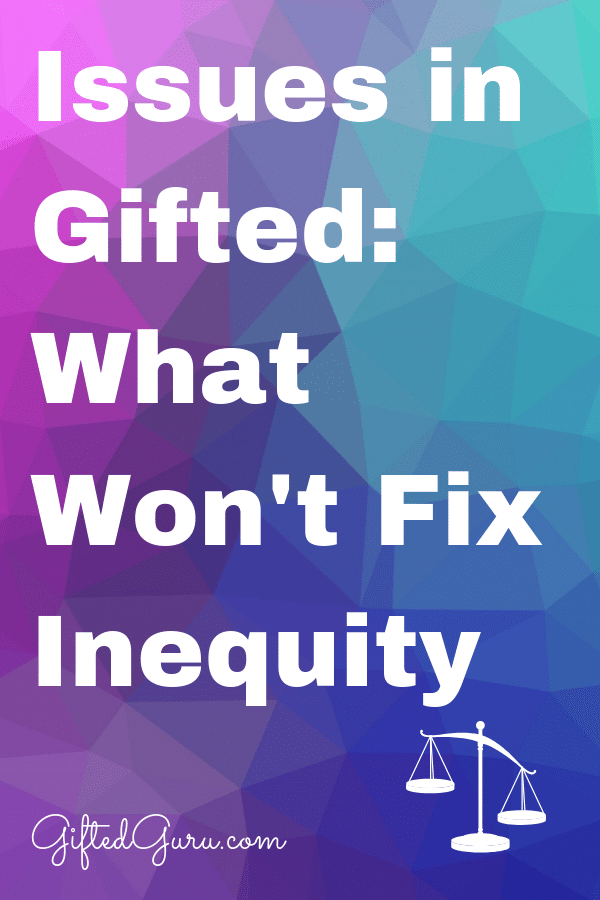As of this writing, the mayor of New York is considering a proposal that would completely dismantle the school district’s Gifted & Talented program in the name of equity. A committee found that the system is inequitable, and in their report they advocated the destruction of services for gifted children of all races and ethnic groups in order to solve that inequity.
It’s a little like cutting off your arm because your finger is broken. No, it’s a lot like that.
Why Is Equity an Issue in Gifted Ed?
Research consistently shows that children of color and children in poverty participate in gifted programs at lower rates than White and Asian and wealthy students.
This issue has been at the forefront of discussion at conferences and in the general gifted education community. You can read NAGC’s info about it or look at the work being done at UConn by Del Siegle and others. If you want to go down research rabbit hole about equity in gifted ed, it’s absolutely possible.
I wrote about it way back in 2011, so it’s not like we just found out. People in the field know, and people in the field care.
How Can We Fix It?
Better Identification Practices
Clearly, better, more equitable identification practices are key. When we rely on a nomination process by teachers or parents, that’s problematic. When we don’t re-assess after initial assessement, that’s problematic. When we don’t screen everyone, that’s problematic. I could go on and on, but let’s just say that one way to fix it is through equitable identification.
Improve the General Education Experience
One of the reasons this is such a hot issue in NYC is that there is a madness surrounding gifted identification there in order to get children in the “good” schools. I don’t use the term “madness” lightly. The test prep industry there is insane, and that’s just for pre-schoolers.
One reason is that there is a (often) real or at least perceived view that GT classes and programs and schools have better student behavior and better resources, not just stronger curriculum.
If we improved equity in the school experience overall, we would lower the (real or perceived) need to manipulate the system to get kids into “good” schools. We would reduce the number of people who felt that the gifted label was the only path to an adequate education.
The recent college admissions scandal proved this isn’t just an elementary or secondary issue.
If one school doesn’t even have working toilets while another has a gorgeous new STEM lab, well, I think you know where people want their kids attending. Who can blame them?
That does not mean we don’t need programs for real, live gifted kids. (The chair of the committee uses “gifted” in quotes, like it’s fake, but it actually exists.)
Use Local Norms, But Know the Limitations
Some researchers have made the argument that school districts should use local norms to identify students, rather than using national norms. That definitely leads to greater inclusion of underrepresented populations.
It’s fine to use local norms if what you’re trying to do is include often excluded students. However, it’s important to recognize that the term “gifted” is real, and that if you use local norms, the programming may not adequately serve students who are gifted in the more traditional sense of very high ability according to national norms.
This leads us back to the age-old argument about what it really means to be gifted, but I think we can agree that the child who has an IQ (obtained by a good test given by a good evaluator) of 145 has different needs from a child who scored in the 75th percentile on an abilities test (national norms), even if that 75th percentile score represents a very high score according to local norms.
So, sure, use local norms, but be honest about what it is and what it is not. If your goal is more kids from underrepresented populations, then Bob’s your uncle. If your goal is also to make sure that gifted kids are adequately and appropriately served, you’re not going to get there with that alone.
Local norms solve one problem, but not all problems.
Improve Race Relations and Diminish Class Distinctions in Schools
These issues are not issues just in gifted education in the United States. It’s an issue in Australia, in Germany, and, well, everywhere.
Every step we take toward better race relations and everything we can do to help level the playing field for students in poverty moves us closer to equity in gifted education.
It seems almost flippant to throw that out as if it were simple, but it does start with individuals. Confronting our own biases, challenging them, and recognizing that we all have a part to play.
I love this article on how to stop being a racist. It’s good even for those of use who grew up in very integrated areas and may not recognize our biases.
These issues are real, they’re difficult to fix (and even talk about), yet they don’t mean that the needs of gifted kids should be ignored while we work them out.
What Won’t Fix Equity in Gifted Education
Killing Gifted Programs Altogether
Oh, friends. This is not the answer.
Researcher Scott Peters, a big local norms proponent, called it “imaginary equity.”
If there’s no pie, it doesn’t matter who’s not getting a piece of it.
One huge issue with this “solution” is that all of the parents who can afford it will flee the public schools, draining them of financial resources and making the have/have not divide even greater.
The other obvious problem is that there are actually gifted kids of all colors and socio-economic statuses receiving services currently. All of them lose out. It’s using the face of the hammer instead of the claw. We need to pry, not slam.
Gifted kids need and deserve services, and the fact that the grown-ups haven’t figured it all out doesn’t change that or make it go away.
Assuming that Schools Have All of the Control They Need
The elephant in the room is that schools can’t control factors that they can’t control. (See how gifted I am? I figured that out all by myself.) Schools can’t fix racism, sexism, or classism – or at least not alone.
Nor can they fix drug-addicted parents, underfunding, kids with nobody at home to guide them with homework, mental health conditions, or any other of the host of issues that impact student performance at school.
Some of these issues are broader societal issues that manifest themselves in gifted education.
Some of these are parenting or poverty issues.
Some of these are just life in an imperfect world.
What they are not is solveable by a school district, and it’s ridiculous to say, “Well, we’ve got problems in our society, so let’s pretend we don’t have gifted kids so we look really equitable.”
That’s not to say that schools can’t do anything. They can. This Brookings Institute article explores some starting points.
But these aren’t gifted issues per se. They’re educational issues, and punishing gifted kids for them makes not one lick of sense.
Continuing to Keep GT Vulnerable to Every Wind of Political Machination
Earlier this year, I spent seventeen hours one day to testify before the educational committee in my state to plead with them not to cut gifted funding. Now, changing the way a state pays for funding is not at all the same as just wholesale slaughter of a gifted program, but it’s a sign that we’re still begging.
Why are we still having this conversation?
We need solid policies in place that protect the needs of highly able students because “highly able” is synonymous with “highly vulnerable,” and it’s ridiculous that the parents and educators of these students are constantly begging for crumbs from the table of educational policy.
The New York Report o’ Madness
In the latest brouhaha in NYC, the report lists all of the people involved. You can read it here if you want to throw up a little bit.
After reading quotes like this: “The SDAG has not found research that can justify or support gifted and talented programs for young children in their current form…”
Really? No research. Do you mean in the messed up way you’re doing it? Probably not.
But there is plenty of research that shows that they’re needed. A simple Google search would lead you… Okay, here you go, just to make it easier.
And then quotes like this…
“In addition to the emotional and social risks posed by the existence of G&T, these programs have been repeatedly proven to enact inequity and have failed to embrace students of all backgrounds.”
Excuse me? The emotional and social risk of having a GT program? Oh, just wait until you see the risks of *not* having one…
And if the programs are enacting inequity, whose fault is that? Can’t you figure that out? The only solution you can think of is destruction? All those degrees on that committe, and that’s the best you’ve got?
Wait, I’ve got a friend who teaches 5th grade GT. Call her. Those kids could figure it out.
This is particularly infuriating when I looked up the credentials of people on the committee. The Executive Committee was composed of: a lawyer, a sociologist, someone with a bachelor’s in business, another business person with a master’s in a field unrelated to education, and another lawyer. What they have in common is an interest and expertise in equity (great) and no experience in gifted ed (the opposite of great).
When GT programs are at the mercy of the ignorant and non-believer, no matter how well-intentioned or how expert in their own field, we will always have issues.
Gifted kids should not constantly have to justify their existence to people who don’t like them or their needs or want to pretend they don’t exist.
Wrapping Up:
I’m the first person to say that we have issues in equity in gifted ed, but throwing the baby out with the bath water is not the answer. Saying that the only way to make it better for one group is to make it even worse for another is a cheap, ineffective answer.
Hopefully, those of us in the conversation and those of us with power over systems will be able to come up with actual solutions so that our children don’t suffer.
You May Also Like:
- My Gifted Anti-Bucket List
- How to Tell a Child He/She Is Gifted
- When Gifted Kids Move: Tips for Parents and Districts
If you’re not getting the emails o’ goodness I send, you can sign up and receive a free guide for helping gifted children thrive in school.







